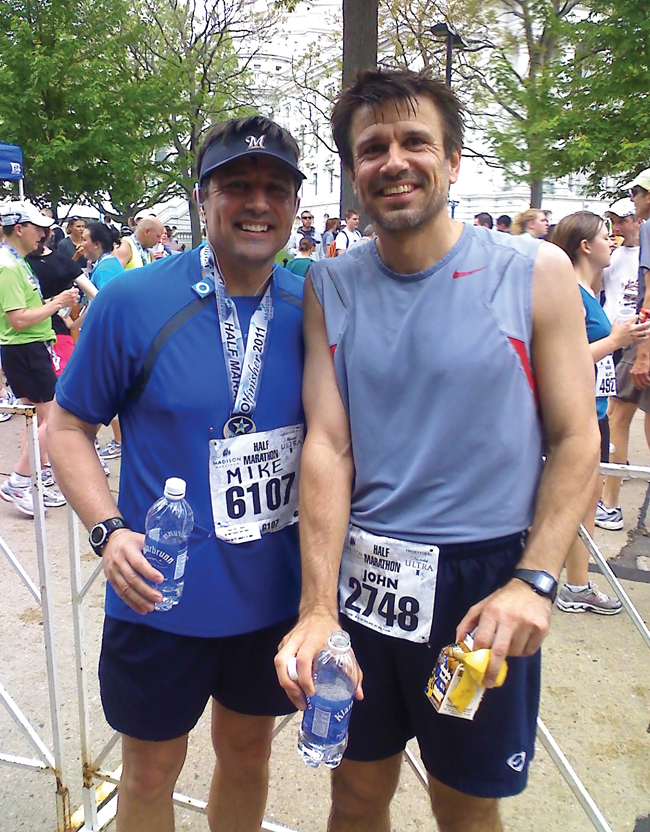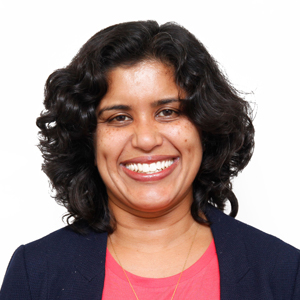Meet John Denu
John Denu at the University of Wisconsin-Madison joined the ranks of The Journal of Biological Chemistry associate editors in July. His laboratory focuses on the roles of reversible protein modifications that are involved in modulating signal transduction, chromatin dynamics and gene activation. In particular, the group studies histone modifications. The American Society for Biochemistry and Molecular Biology’s science writer, Rajendrani Mukhopadhyay, interviewed Denu to learn more about his scientific interests, career and hobbies. The interview has been edited for length and clarity.

Would you briefly explain what your research group is studying?
We are broadly interested in the mechanisms and functions of reversible protein modifications that control signal transduction, chromatin dynamics and metabolism. More specifically, one major goal is to understand the basic biochemical principles that govern epigenetic information written onto histones. This information dictates gene-expression programs and takes the form of a diverse array of histone post-translational modifications, which are added and removed by chromatin enzyme complexes.
Also, we are investigating the links between metabolism and epigenetic mechanisms that regulate gene expression. Chromatin-modifying enzymes rely on coenzymes and substrates derived from metabolic pathways, suggesting coordination between nuclear events and metabolic networks. We are testing the hypothesis that certain chromatin-modifying complexes have evolved to exquisitely sense metabolite levels and respond accordingly, modifying specific chromatin loci for altered gene expression.
Another major effort involves understanding the mechanisms and functions of sirtuin deacylases and reversible protein acetylation. Accumulating evidence suggests that reversible lysine acetylation is a major regulatory mechanism that controls protein function.
Sirtuins are a conserved family of NAD+-dependent protein deacetylases that have emerged as important players in modulating protein acetylation. Compelling genetic evidence implicates sirtuins in genome maintenance, metabolism, cell survival and lifespan. We are examining the central hypothesis that reversible protein acetylation is a major regulatory mechanism for controlling diverse metabolic processes and that, at the molecular level, site-specific acetylation alters the intrinsic activity of targeted proteins. We are exploring sirtuin function as a means to tackle these questions and uncover their role in these processes.
You recently had a JBC paper selected as a Paper of the Week. It was about SIRT6’s activation by long-chain fatty acids. What is the significance of the work?
We are very excited about this discovery and the impact it might have on human health. SIRT6 is linked with aging, cancer and metabolism. The protein is an extremely inefficient histone deacetylase in vitro, suggesting that there is an activating mechanism in cells. In this paper, we demonstrated that SIRT6 is directly activated by free long-chain fatty acids, including ones linked to the health benefits of dietary polyunsaturated fatty acids. These results suggest the SIRT6 is stimulated to downregulate carbohydrate and lipid metabolism during conditions that increase levels of particular omega-3 and omega-6 fatty acids, such as fasting and dietary supplement intake. The discovery of these endogenous, small-molecule activators of SIRT6 suggests the therapeutic potential of compounds that promote SIRT6 function, particularly for improved metabolism, anti-inflammation and decreased tumorigenesis.
Tell us about your academic background and research training.
My (bachelor’s) was in biochemistry from the UW-Madison, where it became clear that I wanted to grow up and be a biochemist. My Ph.D. with Paul Fitzpatrick at Texas A&M University provided training as a classical enzymologist. Postdoctoral training at the University of Michigan with Jack Dixon allowed me to use those skills to tackle new enzymological questions in the signaling field. In Jack’s lab, I became enamored with protein modifications and the idea that PTMs communicate critical cellular information.
 |
| Denu with his brother after a half-marathon. |
What does it mean to you, on a personal level, to be an associate editor for the JBC?
It was a tremendous honor to be asked to serve the JBC in this capacity. In addition to previously serving as an editorial board member, I have authored JBC papers throughout every stage of my career, so the JBC occupies a very special place in my life. To me, the JBC represents a community, and now I get to contribute to this community in a new way as an associate editor.
How is the new role going so far? Have you been surprised by anything during your tenure with the JBC?
So far so good, but the first two months were a very steep learning curve. One of the best aspects of being an AE is the ability to tap into the collective wisdom of the other AEs. The board is an amazing group of scientists, and our discussions on JBC matters are enjoyable with plenty of give-and-take. Perhaps most surprising to me is how we handle manuscripts. Of course, there are important policies and guidelines to follow, but it’s not an impersonal operation where a computer weighs the reviews and spits out a decision. Each of us can bring our own unique perspective to the editorial process.
 |
| Denu before a Warrior Dash with his son and daughter-in-law. |
What do you do outside of the lab? Do you have any advice for balancing life in the lab with life outside of the lab?
When I’m not in lab, I’m still thinking about the lab. Obviously, this can be a problem if you want to have a so-called normal life. But there is nothing very normal about the life of a scientist. It is important to try and press pause routinely. I try to pick nonscience activities that force me to refocus my attention on something completely different. I do this one of several ways: go for a vigorous run, play basketball or work on mechanical problems like fixing or modifying cars. It’s worked for me: I’m still married to the same understanding woman after 25 years, and the two boys turned out fine.
For scientists in training, do you have any words of wisdom or a favorite motto?
Enjoy the work. This is an awesome career, but not everyone is cut out for it. At different stages of your career, do the 50-percent test. If you’re miserable more than 50 percent of the time, it’s time to change your line of work. If you enjoy your work most of the time, keep doing it. I prefer to operate near 90-percent job satisfaction, where the missing 10 percent represents time spent trying to keep the lab funded. Congressional sequester can greatly affect that percentage.
Enjoy reading ASBMB Today?
Become a member to receive the print edition four times a year and the digital edition monthly.
Learn moreGet the latest from ASBMB Today
Enter your email address, and we’ll send you a weekly email with recent articles, interviews and more.
Latest in People
People highlights or most popular articles

Sketching, scribbling and scicomm
Graduate student Ari Paiz describes how her love of science and art blend to make her an effective science communicator.

Embrace your neurodivergence and flourish in college
This guide offers practical advice on setting yourself up for success — learn how to leverage campus resources, work with professors and embrace your strengths.

Survival tools for a neurodivergent brain in academia
Working in academia is hard, and being neurodivergent makes it harder. Here are a few tools that may help, from a Ph.D. student with ADHD.

Quieting the static: Building inclusive STEM classrooms
Christin Monroe, an assistant professor of chemistry at Landmark College, offers practical tips to help educators make their classrooms more accessible to neurodivergent scientists.

Hidden strengths of an autistic scientist
Navigating the world of scientific research as an autistic scientist comes with unique challenges —microaggressions, communication hurdles and the constant pressure to conform to social norms, postbaccalaureate student Taylor Stolberg writes.

Richard Silverman to speak at ASBMB 2025
Richard Silverman and Melissa Moore are the featured speakers at the ASBMB annual meeting to be held April 12-15 in Chicago.

